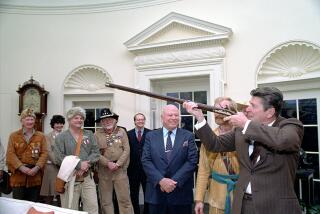Bush May Promote a Socialist’s Ideas, but He Can’t Redefine Rebel Spirit
For George Bush, the American mainstream is located in the center of a creek on Ronald Reagan’s ranch. Only with some such coordinates can one project Michael Dukakis as an extremist.
“Extremist” is a dangerously parochial definition when the future of this country depends on a creative response to the new economic geography of the globe. It is also a view that is downright embarrassing when applied to the American past.
Take the Pledge of Allegiance, one of the central priorities in the vice president’s campaign. The pledge was written, and published in a magazine called Youth Campanion, by Francis Bellamy, a socialist and the cousin of Edward Bellamy, the author of the enormously influential novel--it sold 1 million copies--about a utopian future America, “Looking Backward, 2000-1887.” Francis Bellamy was a founding member of the Society of Christian Socialists in 1889, a group of Protestant ministers who asserted that “the teachings of Jesus Christ lead directly to some form or forms of socialism.”
George Bush, in short, wants to require every teacher and child in America to recite a pledge of patriotic faith that was written by a man who believed in the wholesale nationalization of industry.
Bush is also a successor (of sorts) of the only major-party presidential candidate publicly supported by Karl Marx himself--Abraham Lincoln.
The point is not simply to smirk over the vice president’s historical pratfall. There is an important moral about the mainstream in the event.
The “Bellamyite” wing of the socialist movement eventually became a middle-class component of the Socialist Party led by Eugene Victor Debs. In 1912 Debs campaigned for the presidency on a platform that called for Social Security, unemployment insurance, the minimum wage, women’s suffrage, the 5-day workweek, and so on.
By 1936, as Debs’ successor Norman Thomas used to tell the story, Democratic ward captains in Chicago were explaining to the clubhouse faithful that Social Security was no longer a “commie idea, because we are for it now.”
And by 1988, George Bush bristles whenever Michael Dukakis even mentions his vote to trim the cost-of-living adjustments in a Social Security law championed so prophetically by Debs.
This is hardly to equate Dukakis with Debs. Far from it. Even though my hopes momentarily soar when I hear the vice president describe the Massachusetts governor as an intransigent, far-out leftist, I will vote for him though he is in fact a quite moderate progressive.
Dukakis is, to my mind, not half radical enough, but still clearly superior to the vice president and his crabbed, narrow-minded version of our past and future.
It is, of course, an amusing accident that the vice president has made the words of a socialist visionary into the litmus test for Americanism. It is not an accident that those who started, or endured, outside the mainstream, like Francis Bellamy and Eugene Debs, are the people with the truly deep faith in this nation and its ideals. The abolitionists and feminists, the Populists and the Freedom Marchers, waged their lives on the conviction that Americans could be better than they were.
At my most optimistic these days I dream that Michael Dukakis will turn out like Franklin Roosevelt, a most prudent candidate who, as President, moved the mainstream as no one else in this century has done. But even at my most pessimistic, I am utterly convinced that George Bush cannot define the American rebel spirit out of existence. Our past has already tripped up the vice president, turning him into an unwitting promoter of socialists; our future, I am sure, would be at least as unkind.
More to Read
Get the L.A. Times Politics newsletter
Deeply reported insights into legislation, politics and policy from Sacramento, Washington and beyond. In your inbox three times per week.
You may occasionally receive promotional content from the Los Angeles Times.










